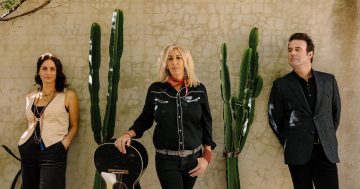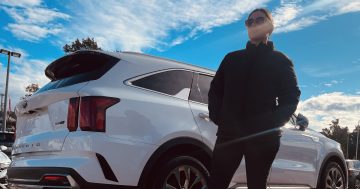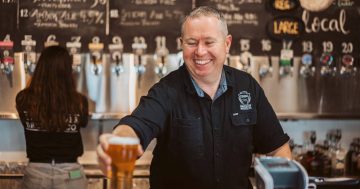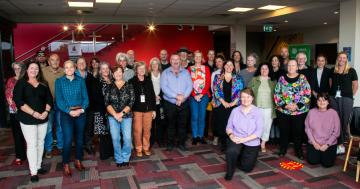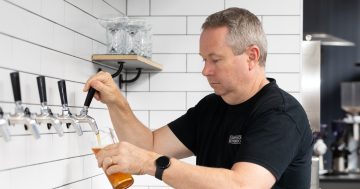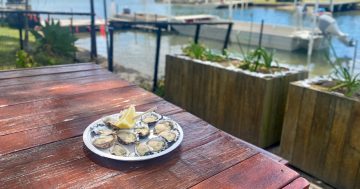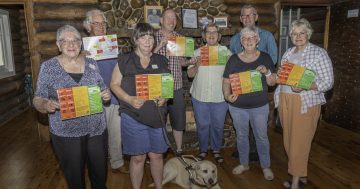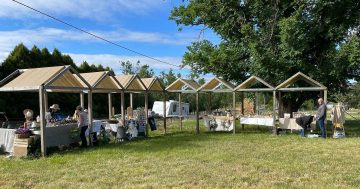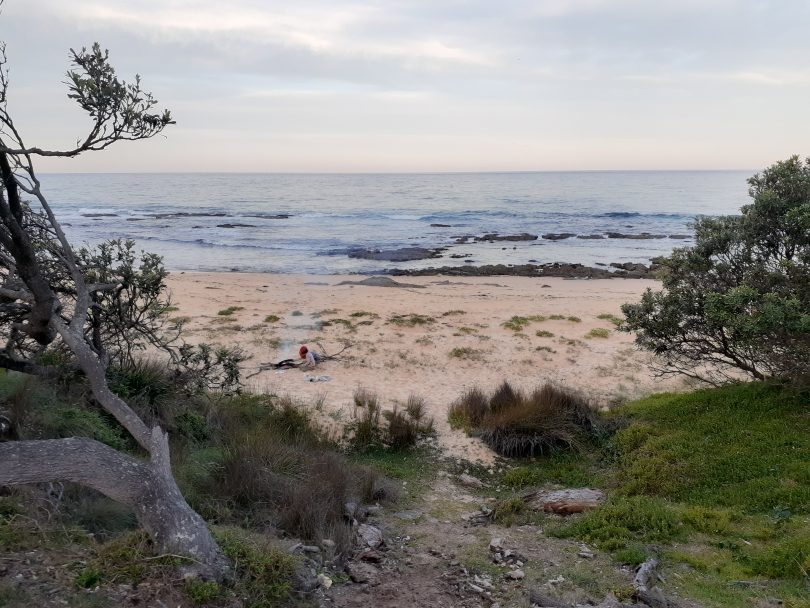
A deserted South Coast beach is a tranquil place to find inner peace during COVID-19. Photo: Elka Wood.
I was at the beach with my family yesterday, it was empty and dusky and we had a fire on the headland, cooked freshly dug potatoes on the coals and ate them hot with butter and salt while we sat on the sand.
Looking around in the soft twilight glow, I saw my rosy-cheeked children, the container of chicken salad flecked with herbs from the garden, and fudgy squares of brownie dotted with squishy dried cherries and milky macadamias and I thought, “Finally, my life is like a Donna Hay magazine, or an Enid Blyton book with an updated menu!”
The current COVID-19 pandemic and extent of the restrictions on our lives has at times been surprising, confronting, frustrating and… wonderful.
While I, and others, had a shaky start in our adaption to a new way of living, it seems everyone I talk to now has good things to say about life in the age of social distancing, marvelling that as our worlds have gotten smaller, our happiness has grown.
With the exception of my four-year-old daughter, who still wants to go to the park every day (“coronavirus says no!”), the feedback I’m hearing is along the lines of, “I think we all know we shouldn’t go back to how it was.”
So, how was it before?
Perhaps the most confusing thing about why there’s such a noticeable difference since COVID-19 came to town is that many of us are so privileged and feel we have nothing to complain about.
Nice houses, a 40-hour workweek, expendable income, free time. Right?
Something I’ve been pondering since noticing positive changes in myself has been that my work hours haven’t changed much. Mostly what’s been cut from my life is fun stuff, or at least tolerable stuff, such as school and community events, playdates, visits with family, dinners with friends and weekends away.
It’s kept us so busy we haven’t had time to reflect on how we want our lives to be.
Our world leaders are growing increasingly anxious because the longer this all goes on, the more likely people will be reluctant to return to ‘normal life’.
We’ve accidentally been let off the economic wheel and can now look back and see the cogs for what they are: us. Exhausted, stressed and now slightly embarrassed to have fallen so hard for capitalism’s charms; principled right up to the minute we’re offered that well-paid job.
To be fair, moderation in capitalism is difficult to achieve. It’s kind of like addressing overeating in that you can’t go cold turkey; we must eat and unless we’re going all-out extreme, we must be part of some economic system.
Since COVID-19, it’s not that I don’t sometimes feel stressed, but generally I feel closer to peace and the only explanation I can think of is that we are doing less and have fewer choices.
It’s a feeling I hear echoed around me.
“I don’t even know what it was that kept me so busy before, but I love this, it’s a simpler life,” a friend of my mum’s told me.
Doctors recommend using yoga and meditation to train ourselves to find peace where there is none so we can continue to live our busy lives. But what if the solution is as simple as doing less?
As I walk through the bush, barefoot and silent, reaching out to touch the smooth trunks of spotted gums, making eyes with a grey kangaroo, still as a statue, I feel I don’t need yoga or meditation to get me through this life any more.
I’m salty and loose-limbed and my mind is free, a feeling usually only achieved on holidays of a week or more.
And as I bite into one of those brownies on the beach, I realise it was never about the Donna Hay-worthy food.
I could’ve thrown together this picnic in our pre-COVID-19 life and we could have wedged it between all the other things in a weekend.
What I couldn’t conjure up is the expansiveness of time that we have now.
The thing that we lust after when we page through a magazine is having the time to swan about in a field at sunset with no concern for the past or future.
We’ve mistakenly believed for so long that making brownies or buying something will have the same effect, but it was never going to replace what we’ve been donating to capitalism for so long: our precious time.






